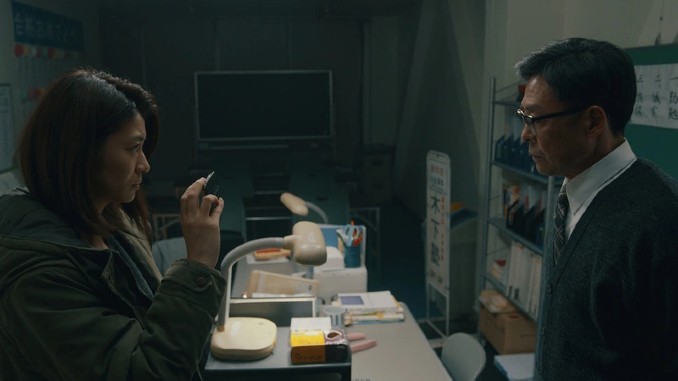A Balance Explores the Cost of the Truth and a Culture of “Canceling”

The eternal quandary of documentary filmmaking is that it is inseparable from the (un)ethical line it toes. At what point is exposing the truth—often an ugly truth—exploitation, especially when that perceived truth is known to hold an inherent bias; when bits of that truth have been withheld to create a desired narrative? It’s a question dealt with during the first few minutes of director Yujiro Harumoto’s sophomore feature A Balance, where documentary filmmaker Yuko (Kumi Takiuchi) must compromise the truth for her upcoming film.
Yuko’s TV movie is set to detail the controversial case of a local teenager who had an affair with her teacher, and the successive reveal and bullying that caused the pair to commit suicide. The father of the deceased teenager blames the school and the media. But while screening the in-progress film for the executives who commissioned the film, it is requested that the father’s line of dialogue be altered. It’s not what was supposed to be in the script, and such a statement might end up creating enemies for them, Yuko and her crew. Yuko, in spite of herself, agrees to alter the dialogue so that it sounds as if the father places blame solely on the school.
Within Japan’s tightly held culture of shame, Harumoto explores the limits of truth when collective shame can be a fate worse than death. It’s interesting to think about in comparison to the West, especially in America, where an embarrassing or disgraceful scandal can—especially when it comes to prominent people—blow over, or even work towards someone’s benefit. But that isn’t always the case. “Cancel culture” is now officially defined by Merriam-Webster as “the practice or tendency of engaging in mass canceling, as a way of expressing disapproval and exerting social pressure,” which all happens primarily on social media. The functionality of cancel culture can be positive in terms of exposing and getting accountability for unwanted, degenerate behavior, but the breadth of perceived degeneracy is often unequally weighed from instance to instance. It all amounts to a similar excision from society that harkens to the kind depicted in A Balance.
While Yuko is filming and interviewing the people at the center of this tragedy, she discovers a shameful secret from her own life. Her father had sex with a teenage student at the test prep school that he and Yuko teach at together—and the student, Mei (Yumi Kawai), is pregnant. Mei, whose mother died some time ago and whose father is neglectful at best, implied to be abusive at worst, insists that the pregnancy be kept a secret. Yuko attempts to unearth the price of shame paid by everyone within the orbit of a scandal through her film, but must simultaneously retcon the scandal in her own life, attempting to go through the necessary steps to get Mei access to an abortion.
-

-

-

-

- Curated Home Page Articles By Test Admin October 21, 2025 | 3:10pm
-

- Curated Home Page Articles By Test Admin October 21, 2025 | 2:57pm
- Urls By Test Admin October 21, 2025 | 2:57pm
- Curated Home Page Articles By Test Admin October 21, 2025 | 2:55pm
-

-

-

-

-

-

-

-

-

-

-

-

-

-

-

-

-

-

-

-

-

-

-

-

-

-

-

-

-

-

-




































